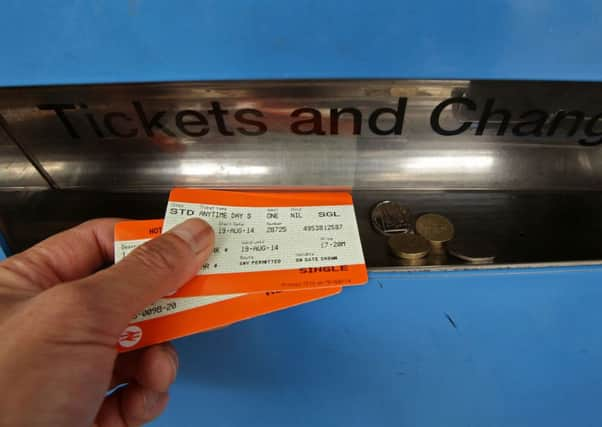Fury at above-inflation rail season ticket price hikes


The full pain of the annual price hike was revealed when the rail industry released details of the new fares for England, Scotland and Wales which will take effect from January 2 2015.
Although the fare increase for all types of ticket averages 2.2%, season tickets are going up by 2.5% - not only well above the CPI inflation figure but also in excess of most annual pay rises.
Advertisement
Hide AdAdvertisement
Hide AdAnnouncing the rise, rail industry body the Rail Delivery Group (RDG) said the money from fares helped maintain the railways, thus benefiting passengers and the economy.
But rail unions condemned the fare rise, while the Campaign for Better Transport called for a stop to “consecutive governments deliberately forcing up rail fares”.
The January rise will see some season ticketholders pushed in to the £5,000-a-year price bracket, while those on the long commute from Cheltenham Spa to London will have to fork out £9,704 - a 2.49% hike on the January 2014 figure.
Some season tickets in the north of England are going up by less than 2%, including Leeds-Wakefield, which rises 1.2% to £1,004, and Morpeth-Newcastle, which increases 1.54%.
Advertisement
Hide AdAdvertisement
Hide AdBut on many of the busiest towards-London commuter routes, the January 2015 rise is above 2.4%.
The RDG said the average rise for all fares was the lowest for five years. RDG director general Michael Roberts said: “Money from fares goes towards running and maintaining the railway. This benefits not just passengers and businesses but communities across the country, by improving journeys, creating employment and helping to boost the economy.”
But TSSA rail union leader Manuel Cortes said: “It is time to stop this annual persecution of passengers with year-on-year hikes in fares. We have seen fares jump by as much as 245% on key routes since privatisation 20 years ago.”
Commuters, passenger groups and transport unions voiced anger at the “scandal of Britain’s great rail fares rip off”.
Advertisement
Hide AdAdvertisement
Hide AdMany passengers vented their frustration at the price hikes, with some questioning whether the added expense would lead to an improved rail service.
Samantha Ovens, an artist from London, tweeted: “Any justification for a further increase in rail fares. When we have the most expensive travel service in all of Europe?...err....nope!”
James Mulloy, a secondary school teaching assistant from Trowbridge, Wiltshire, said: “The fares are a disgrace in this country. Once my railcard expires I may stop using them.”
Dawn Foster, from Liverpool, wrote: “Rail fares going up again in January, let’s hope you get your trains updated soon.”
Advertisement
Hide AdAdvertisement
Hide AdAudio engineer Dave Roberts said: “2.2% might well be the lowest rise in train fares in five years, but it’s still double the rate of inflation. I’ll have to consider park and ride.”
Garry Clayton, from Wigan, Greater Manchester, said: “Rail fares set to rise by 2.2% but will still be standing room only for the Wigan to Manchester train. Should be cheaper for those who stand.”
Christian Hoggard, a PhD student at the University of Southampton, wrote: “We should not be celebrating the ‘lowest rise in train fares in five years’. It’s still a rise. More money than last year and before that!”
Another Twitter user, under the handle @DJSinghX wrote: “Why they need to increase rail fares every January I don’t know. I mean if service improved I wouldn’t mind. Can’t they just be more efficient?”
Advertisement
Hide AdAdvertisement
Hide AdMick Cash, general secretary of the RMT transport union, said: “The scandal of Britain’s great rail fares rip off is that today’s hike is far outstripping average pay increases and it will once again hit those at the sharp end of the austerity clampdown the hardest.
“After two decades of privatisation the British people pay some of the highest fares in Europe to travel on clapped-out, understaffed and overcrowded services while the private train companies are laughing all the way to the bank. Today’s fares announcement just fuels that scandal.
“We say fares should be cut and not staff, and public ownership would allow us to do just that.”
Martin Abrams, from Campaign for Better Transport, said: “Consecutive governments have deliberately forced up rail fares and it needs to stop.
Advertisement
Hide AdAdvertisement
Hide Ad“During this Parliament, many fares have risen three times faster than wages, affecting all those who rely on trains and putting enormous strain on household budgets.”
He added: “Whoever is in power after the General Election urgently needs to adopt a much fairer approach to ticket prices. There must be a permanent end to above inflation fares rises, not just the temporary respite currently in place.
“We also need tickets that are in line with modern lives. Over eight million people now work part-time and many more work flexible hours. Very few train companies offer tickets for this growing group, leaving them stuck paying over the odds for full-time season tickets they don’t need. Government must rethink its approach on this and not abandon its promise of nationwide help.”
David Sidebottom, director at the independent watchdog Passenger Focus, said it was a “good time” for the rail industry to look at the value for money for commuters.
Advertisement
Hide AdAdvertisement
Hide AdHe said “Although fares are still set to increase, passengers will be relieved to see that the average rise in England is capped at inflation instead of inflation plus one percent as was previously planned.
“It is also good to see that there is no flexibility for individual fares to go up by more than this. Both of these are things we have pushed for.
“This is a good time for the industry to look at the value for money of fares; only just over four in 10 passengers are currently happy with the value of their ticket.
“What is now needed is a more consistent day-to-day service, and a flexible fares structure that delivers the type of products that passengers want.”